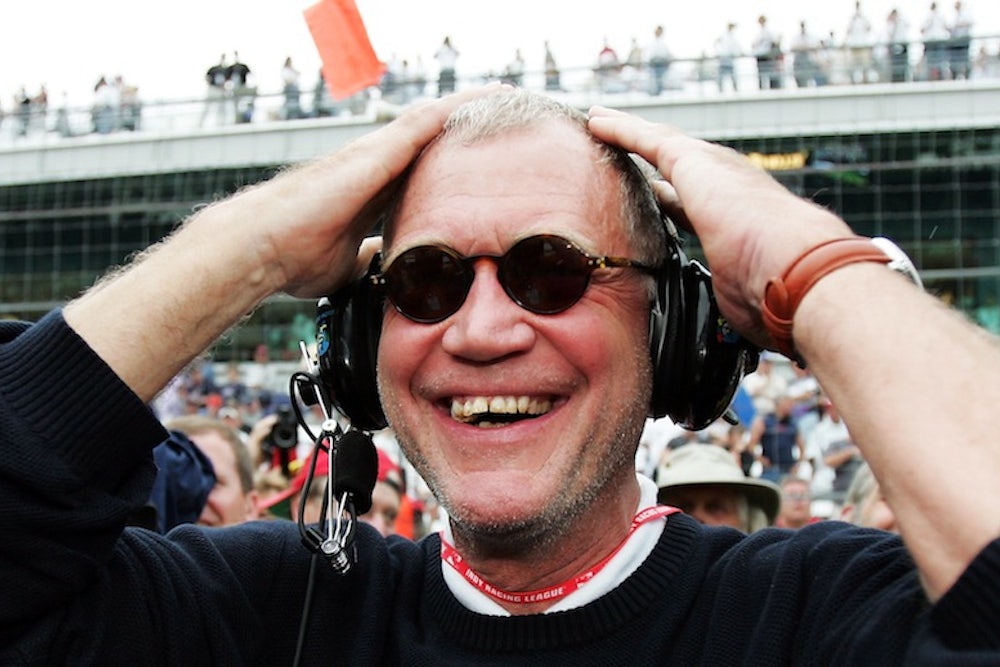Now that David Letterman has announced he will step down from his television perch next year, it's worth thinking about why he was such a large and important figure for so many people. (I would venture to guess that TNR readers, on average, have a much higher opinion of Letterman's brand of humor than Jay Leno's). And indeed, part of Letterman's importance was that he was constantly compared to Leno, who managed ratings dominance with a slew of Clinton-likes-sex and Bush-is-dumb jokes over the past twenty years while managing to attain the respect of essentially no one who wrote about television or even just took it seriously. Letterman was Leno's opposite in every possible way, except one: they were both frequently very, very unfunny. In Letterman's case however, his unfunniness was the secret to his importance.
The most striking thing about Letterman's show is how Dave-focused it is. His personality dominates. When Leno or Jimmy Fallon has a movie star on, the movie star often becomes the center of the program, largely because the interviews are so soft and friendly (and in Leno's case, often obnoxiously flirtatious and embarrassingly fawning.) With Letterman, you never knew. He would ask strange questions. He would make clear his displeasure or boredom with the person in the other chair. He could even be confrontational. (This famous Madonna interview, including Letterman's introduction, is as shocking and funny as it was at the time.) In short, he was the person you were watching.
But the central way in which Letterman dominated the show was that he simply insisted on doing skits and telling jokes that he thought were funny. I can't think of a mass cultural figure of such large importance who was so committed to his own idea of artistic integrity. And by integrity, I merely mean that he would not tell the kind of jokes that got cheap laughs if he didn't like them. He would do his short monologue, and then he would go sit down and chat with people on his staff, or throw something off the roof (like a watermelon), or send a camera out into the street. Sometimes these bits were brilliant—my favorites were his back-and-forth with Rupert, his deli-owning neighbor—but often they were not funny at all. They were frequently too long, or weird, or unstructured. But Letterman didn't seem to care.
Not only was this shocking, especially for those of us who started watching him when Leno was his competitor, but it made him seem nearly heroic. He just didn't seem to bother with trying to please a mass audience, even when, somewhat surprisingly in retrospect, he really was winning the ratings war. This of course was what was behind the disaster of his Oscar hosting, when he decided that if hundreds of millions of people didn't care about a stupid word game (if one can even call it that) involving Oprah Winfrey and Uma Thurman, then too bad. He thought it was funny.
These dreary bits are what made his show, at least in my opinion, unwatchable after the age of 18, or at least unwatchable on a nightly basis. This might be partly because Letterman got lazier and less funny as he got older, but it was also because once you grasped Letterman's unique schtick, it wasn't all that interesting, or at least individual shows weren't that interesting. I would still occasionally tune in and enjoy him for his banter (his interviews are still much better than other hosts') or his sheer oddness, but watching him at length was never sustainable. I was glad he was there, doing his own thing, but that's about it.
Still, some of his best stuff was absolutely fantastic. (I urge people to check out his run of shows in 1996 when he visited San Francisco for a week.) And it's hard not to be happy (and, again, somewhat surprised) that a figure so devoted to his own brand of humor could stay on the air for so long. If he will be remembered for his unique sense of humor and occasionaly crustiness, moreover, he will also be remembered for his occasional seriousness, often in the form of long monologues about things like 9/11 and his heart problems. They were often touching, and never felt tossed off.
Bad jokes that only the host laughs at are one thing, but having to watch hosts tell jokes that they know are terrible is quite another. There is too much of the latter on television—it is a business after all—and so for that reason and several others, Letterman was a unique figure on late night television.
